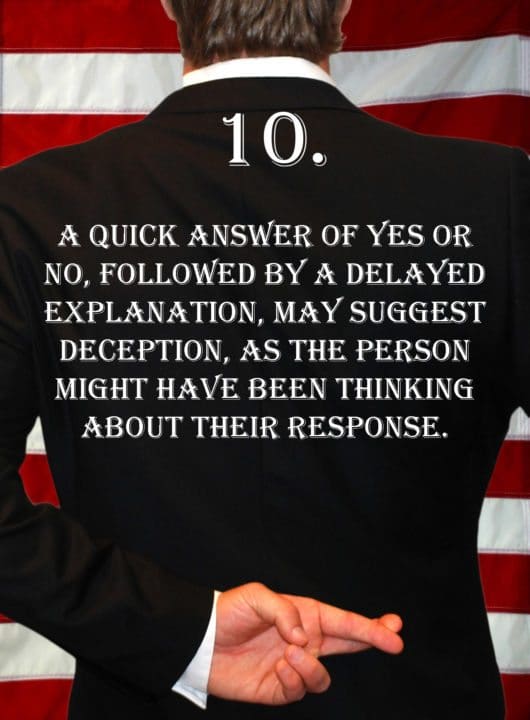
Deception Tip 100:
Liars try to sound smarter, and more credible, than they actually are. Trip them up by using their own jargon against them.
Listen To The Podcast!
E100 – Liar’s Jargon – Deception Tips Podcast – Click Here To Subscribe
Podcast Transcript
Hello and welcome to the Deception Tips podcast where you will learn amazing cues to detect deceit that will help you read people like never before. I’m your host Spencer Coffman, let’s get started.
Hello and welcome to Deception Tip episode 100, this is the big double zero, we’ve made it for quite a while now. We’ve got quite a few episodes out there, 100, this is 100 today, plus I guess the trailer, so technically, we have a hundred episodes live, this is 101 but it’s 100, Deception Tip 100.
Thank you so much for continuing to listen, congratulations on making it this far, we’ve really only got one more deception tip. If you’ve been following along in the books or the blog, you know what this tip is and you know what the next tip is, so we’re going to dive right into it.
Last time, we talked about how agreeing with liars can help you get more information from them. It can make them feel more comfortable with you, it helps them build a little rapport, a little bit of trust. They start to like you and when people like you, they’re more apt to open up to you, to talk to you, to tell you things.
How do you get them to like you? Well, it is by getting them to believe that you care. How do you do that? You need to ask questions that probe deeper into their lives.
Also, you need to listen to what they’re saying, you can’t be cutting them off, interrupting them, nothing like that. You need to focus on what they’re saying, reply to it, pay attention and you need to show them some respect.
Also, getting them to talk more and relating to them helps a lot. So, if you relate to them and they relate to you then they will also be more apt to open up to you.
We talked about all of that in last week’s episode and in several other episodes prior to that. I encourage you to check out all of those episodes and a little tip here, I will have all of those episodes in video form on YouTube and I’ll put them all on a playlist.
You’ll be able to see which episodes relate to each other and watch them all on video form, which are only about five minutes long. You’ll get a summary there if you don’t have 15 minutes, so that’s a great little tip.
You can use that to review all the information, refresh your memory and continue learning about detecting deception and reading people so that you will not fall victim to lies.
Today, we are going to talk about another tip, this one is something that liars may use to trip you up. Liars like to appear smarter and better than they really are, they want people to believe them, to be convinced by what they say, they want to sound smart and they want to sound credible.
In doing that, they may talk about a lot of things that they don’t know about. Well, of course, they don’t know because it’s a lie. We talked about this a long time ago in a previous deception tip on how they may use a lot of extra details. We talked about this in Detailed Stories and they like to speak in more detail, they want to use more dates and facts and things like that.
Let’s face it, quote, unquote, normal people do not remember all of these dates and details, we don’t, we talk about things and we mentioned them. If you watched a documentary or you read it in a book, you probably don’t remember the exact date or the book or all of this stuff, you just remember the fact, you remember the takeaway.
People who give you every single thing like they’re reading it from an encyclopedia, that’s too detailed for normal people. Some people can or if they’ve memorized facts, they can but keep in mind that in general, this level of detail is typically not used, we talked about that in episode 17, by the way.
People who lie, they definitely like these details but they also want to seem a lot more intelligent. As a result, they may use some larger words or some jargon that relates to whatever it is they’re talking about. Of course, all of the details will also make them seem a little bit more intelligent.
Like holy cow, how can this guy remember this date and this time and this person’s name and all these things and how it all fits together. Then that sequence happened to this and then this led to this and now they’re spinning this entire relating conspiracy-type story that really sounds accurate. Most people can’t do that, so it’s a little bit, let’s face it, abnormal.
Sorry for those of you who can, it’s a gift for you and you probably use a lot of the jargon or the terms. When people lie, they like to use this jargon, these terms because they figure no one is going to question them on it because most people don’t understand it, so that’s a tip for you as well, question them on it.
Here it is, Deception Tip number 100. Liars try to sound smarter and more credible than they actually are, trip them up by using their own jargon against them. Here it is again, Deception Tip number 100. Liars try to sound smarter and more credible than they actually are, trip them up by using their own jargon against them.
So, guys, this is important, when liars are using these large terms and this jargon, challenge them on it. Even if you know what it means or what they’re talking about, if they start talking about, ‘yeah, well, I know so-and-so is not telling the truth because I was spotting the leakage on their face and the action units five and seven and that was around their mouth.’
You could say, ‘okay, well, I know body language, I’ve studied it, I’ve been listening to some podcasts for a couple of years and studying. I’ve read a couple of books on it, what do you mean when you say leakage?’ They might say, ‘oh, well that’s when something leaks out.’ ‘Okay, well, be more specific, what are some signs you notice?’
If they can’t tell you, okay, they’re using some jargon that they don’t know what it means. You can dive in, ‘so you mentioned something about action units, what’s up with an action unit, they’re like a little figure you put on a desk?’ They’re like, ‘oh no, no, that’s little muscles in the face.’ You could challenge them on all that stuff and get into that discussion about micro-expressions.
This is an example that you would know about but even in an example that you don’t, if someone starts talking about, ‘when you add certain additives to water, you would treat it and kill the bacteria. You have to do 20,000 gallons an hour or 2000 gallons a minute’, or whatever the facts are. If they start talking about this and you can use some “metha metha lada lada ding” and put that in the water and it treats and it kills 87 different kinds of bacteria.
They go into all this detail and these terms and you think, wow, this guy knows a lot about water, but do they? Even if you don’t know, you could start asking them, hey, you said ‘whata-bouta-ding’ product does X, Y, Z, tell me about the product and see what they can tell you. Who makes it, how long has it been in use, and have they done any studies? Get some details, and ask these questions.
Chances are, they’re not going to know and even if they are telling the truth, they’re probably still not going to know but the way they respond is going to be different. If you say, are there any studies? They’ll be, ‘oh, you know, I’m not sure about that but I can look into it, that’s a good point.’
They’re going to be a little more respectful to your line of questioning if they’re telling the truth. We’re going to talk a lot more about this and I’m going to give you some more examples, we’re going to come back to this situation, all of that coming up right after this.
Tired of being lied to day in and day out? Want to learn how to spot a liar? Get the Revised and Expanded Edition of the Deception Tips eBook on spencercoffman.com.
Welcome back to episode number 100 of the Deception Tips podcast. Today, we’re talking about liars’ jargon and how they may use terms to help themselves sound a little bit smarter and more credible than they really are. What you can do is challenge these terms, that’s very important, even if you understand them, challenge them, question them.
Don’t put them down or anything on it but ask them more questions, use these terms to dig a little deeper. Right before we took a break we were talking about the water and how, if someone is telling you all about some kind of chemicals, you can question it. What kind of product did you say you use? They’ll tell you. Where was this product made, and in what country?
Wow, that’s an answer, most people, do you even know where your toilet paper is made? Most people don’t know but if they know, they’re going to tell you and if they don’t, they’re probably going to tell you anyway. So, you need to pay attention to this because yes, you’re not really looking for the answer to these things, you are looking for their responses to the answer.
You say, well, where was it made? Have they done any studies on it? How big is the company? What’s the company worth? There’s an answer that no one is going to know. Ask these questions, they’re legitimate questions but they’re probing deeper, and based on their response, you will be able to tell whether they’re telling the truth or not.
They may get all upset, why you’re asking all these questions, okay, maybe that’s a red flag, they’re not telling the truth. A truthful person would respond a little bit more openly.
They would say, ‘I don’t know, I don’t know when the company was founded, I don’t know how big the company is, I’m not sure what it’s worth, I don’t know where the stuff is made but these are all great questions that I’ll have to find out more about and I can get back to you.’
You say, ‘yeah, that’d be great, I’d like to know more about it.’ Maybe you do, maybe you don’t but it’s the response. They get all heated and like, ‘well, why would I know that, that’s a stupid question.’
Okay, well then you probably aren’t telling me the truth. So, you’re judging the emotional response here. That’s what you’re probing for, you’re probing for a temper, you’re probing for impatience and intolerance.
Most people who are telling you the truth, who are genuinely telling you about a certain product or a certain item or a certain thing that they know about, they’re telling you because they’re happy they know about it. They’re sharing their knowledge with you, which means if you start asking more questions, they’re going to be so excited because guess what, someone else is interested in what they’re saying.
It’s like when people talk to me about my books or when they start asking about my podcast, oh, you can’t believe it, it makes my day, I’m so excited to tell them about them.
It sounds like I’m bragging a little bit when I tell them about it but hey, they asked. So, when people are telling you stuff and you probe deeper and ask more questions, the normal response, is they shouldn’t get upset about that, they should be thrilled that you want to know more.
Even if they don’t know more, man, when people on YouTube say, ‘hey, Spencer, how do I do this and this? You made a video on this but how do I do this?’ I can’t wait to find out and make a video for them, I can’t wait, it’s so exciting. So, that’s how most people are going to feel when you were asking them questions about something they’re passionate about and something they know about.
If they don’t know, they’re going to be so excited to find out and they’re going to be so excited that you want to find out. So, keep that in mind that you’re not really challenging everything, you’re not being some doubting Thomas or a cynical person that just doesn’t believe anything they’re saying, no.
You are going through this with them and you’re asking these questions and getting them to give you more information. You’re judging their emotional and temperament response, and how they feel about it all because that’s going to tell you whether or not they’re being deceptive.
Using jargon against them is also a great way, so if they’re using these big terms and you happen to know some big terms of your own relating to that field, you can throw them back at them and see what they mean. So, if someone’s talking about the brain and they say, ‘yeah, my hippopotamus connects to my amygdala and something is not firing right up there and my cerebellum is off.’
You say, ‘uh, the hippopotamus is an animal, I believe you mean hippocampus.’ ‘Oh yeah, that’s what I meant.’ ‘By the way, what about in the singular cortex, does anything fire over there a little off? You have some kind of thing with your speech, that could be like a Broca’s area.’ You could probe deeper with some knowledge you may have in that area.
If they say, ‘boy, you know what, that’s way over my head, I have no idea what you’re talking about, I only know a little bit about what the doctor told me is going on.’ Okay, pretty truthful but sometimes a liar may run with it. ‘Oh yeah, they said that too, my Broca’s area is backward and that’s why I can’t do this properly.’
You’re like, ‘well, I know Broca’s area is speech, so that has nothing to do with your motor actions, that would have been in your motor cortex or the primary motor cortex, therefore, I’m really doubting what you’re saying right now.’ You could use your own knowledge and bring in other terms to trip them up and we’ve talked about this as a strategy over the past a hundred episodes.
How you can use things to bring in or even how you could tell your own lie and get them to use it and incorporate it into their story and then you know they’re lying. We talked about that as well in a past episode, I encourage you to check out those episodes and dig through.
As I said, I could spend half of this episode telling you about all these things that relate together because they do relate together. Remember we’re looking for patterns and clusters of behavior, therefore, over a hundred tips that I’ve given you, a lot of them should hopefully be related together otherwise we wouldn’t have any patterns or clusters of behavior.
So, check them out, relate each one to each other, put these connections together in your head. As you’re listening and thinking, remember like, oh yeah, that was this one or this one or this one, and put these together. If you want to start cataloging, drop it in the comments.
Say, ‘hey, in episode 42, this relates to this one, this one, this one, and this one, wow, how cool’. Go ahead, do that, put them on YouTube in the comments on the videos, I’d really appreciate it so would the other viewers. Remember to look for those patterns and clusters of behavior, use your knowledge in conversation with other people and see how they react.
I want to thank you for listening to this week’s episode of the Deception Tips podcast. I hope that you’ll share it with your friends, subscribe to the feed, take a look at the videos, the blog, and the books that I have available, and, as always, tune in next week for a new deception tip.
Video Transcript
Hey guys, my name is Spencer Coffman, thank you for watching the Deception Tips videos. They’re all about teaching you how to read people and detect deception so that you will be able to tell if someone is lying to you. Today, we are on a very special episode we’ve hit a new mile marker, a new landmark. We are going to talk about a great tip that you can use to trip up liars.
Liars may speak with some extravagant languages or unconventional languages or some jargon that they may not even know what they mean. They’re saying it to sound smarter, more dignified and you can use that to trip them up. So, here it is, this is Deception Tip number 100. Liars try to sound smarter and more credible than they actually are. Trip them up by using their own jargon against them.
You can use this against them in any way you see fit. If all of a sudden, they’re talking and giving you some big words, maybe you have some big words of your own and you just hand them back to them and they may not know what they mean. If they’re using some industry-related words, maybe they’re talking about money and banking and they’re using big words.
Well, you need to make sure you know about the transactions and transgressions and you say wait a minute, transgressions? They’re just using big words that they think are related to that industry, you called them out, they weren’t even related at all and you saw that little lie right there. You can use that, or you could also ask them more about the industry.
So, if they’re talking to you about the structural stability of some building and it’s not sound and you say well, tell me more about this type of building, what would you do here? What about an arch bridge or how about the Greek and Roman buildings where they have those flying buttresses, do you know anything about those? They might be like what are you talking about?
Well, I’m talking about the same thing you’re talking about, you brought it up, don’t you work in that field? Maybe you called them out in a lie right there, so as I said, any type of example that you can think of or give. If someone starts to get very specialized, they start to dive into more big words and getting into the science of things, the cell level, molecular biology, APT this or it’s coenzyme A or Q10.
They start naming specific things, you can start naming some specific things of your own to see if they can either keep up with you or not. You may start to look like a fool though because if all of a sudden, they’re talking about oh, this thing has got riboflavin and this and that and you say, oh yeah, I’m familiar with coq10, they might look at you like what are you talking about, coq10 isn’t even related?
You may not know what I’m talking about, but it doesn’t matter, the point is whatever industry there is, you probably know something about it. Whether its construction, health, anything like that, you probably know something. So, if they start talking with some big words or some details, use some big words or some details of your own.
One of two things is going to happen, either they won’t be able to keep up with you and in which case you know they’re lying or they will start to walk all over you and say, oh no, it’s this, this and this. They’re going to prove to you that they know what they’re talking about in which case you know they’re telling the truth.
So, just remember that liars may sometimes use these jargon or big words, they may also use unconventional language which we talked about a long time ago in Deception Tip 31, you’ll see a card here. Use these big words against them or challenge them with it and if they can step up to the plate and they call your bluff, you know that they weren’t lying, you can move on. Start to look for other patterns and clusters of behavior because if they are lying there will be more than one sign.
Maybe they just studied a little bit more than you, so maybe when you challenge them, they’re like, oh, good thing I rehearsed this. They know a few more big words where you stop but they may be lying, so don’t give up, look for other signs, there will always be more than one sign. Watch for them, pay attention to them, you know them, just put them into practice, use the techniques, use the tactics, and find out if they’re lying or not.
So, if this is your first time watching these videos, I’d love to have you subscribe to the channel on YouTube. Feel free to comment with any questions you may have as well. Also, if you’d like some more information, we have books, blog posts, and podcasts all available on spencercoffma.com that are dedicated to teaching you exactly what every body is really saying.
Until next time.






